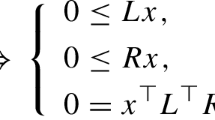Abstract
A new algorithm for solving linear complementarity problems with sufficient matrices isproposed. If the problem has a solution, the algorithm is superlinearly convergent from anypositive starting points, even for degenerate problems. Each iteration requires only onematrix factorization and at most two backsolves. Only one backsolve is necessary if theproblem is known to be nondegenerate. The algorithm generates points in a large neighborhoodof the central path and has the lowest iteration complexity obtained so far in theliterature. Moreover, the iteration sequence converges superlinearly to a maximal solutionwith the same Q-order as the complementarity sequence.
Similar content being viewed by others
References
J.F. Bonnans and C.C. Gonzaga, Convergence of interior point algorithms for the monotone linear complementarity problem, Research Report, INRIA, P.O. Box 105, 78153 Rocquencourt, France, 1993; to appear in Mathematics of Operations Research.
J.F. Bonnans and F.A. Potra, Infeasible path following algorithms for linear complementarity problems, Reports on Computational Mathematics 63, Department of Mathematics, The University of Iowa, Iowa City, IA 52242, USA, December 1994.
R.W. Cottle, J.-S. Pang and R.E. Stone, The Linear Complementarity Problem, Academic Press, Boston, MA, 1992.
W. Cottle, J.-S. Pang and V. Venkateswaran, Sufficient matrices and the linear complementarity problem, Linear Algebra and Its Applications 114y115(1989)231–249.
J. Ji, F.A. Potra and S. Huang, A predictor-corrector method for linear complementarity problems with polynomial complexity and superlinear convergence, Journal of Optimization Theory and Applications 84(1995)187–199.
M. Kojima, N. Megiddo, T. Noma and A. Yoshise, A Unified Approach to Interior Point Algorithms for Linear Complementarity Problems, Lecture Notes in Comput. Sci. 538, Springer, 1991.
K.A. McShane, Superlinearly convergent O (√nL)-iteration interior-point algorithms for linear programming and the monotone linear complementarity problem, SIAM Journal on Optimization 4(1994)247–261.
S. Mizuno, A superlinearly convergent infeasible-interior-point algorithm for geometrical LCPs without a strictly complementary condition, Mathematics of Operations Research 21(1996)382–400.
F.A. Potra, On Q-order and R-order of convergence, Journal of Optimization Theory and Applications 63(1989)415–431.
F. A. Potra, An O(nL) infeasible-interior-point algorithm for LCP with quadratic convergence, Reports on Computational Mathematics 50, Department of Mathematics, The University of Iowa, Iowa City, IA 52242, USA, January 1994.
F.A. Potra and R. Sheng, A large-step infeasible-interior-point method for the P*-matrix LCP, SIAM Journal on Optimization 7(1997)318–335.
F.A. Potra and R. Sheng, Predictor-corrector algorithms for solving P*( κ)-matrix LCP from arbitrary positive starting points, Mathematical Programming 76(1997)223–244.
F.A. Potra and R. Sheng, A superlinearly convergent infeasible-interior-point algorithm for degenerate LCP, Reports on Computational Mathematics 66, Department of Mathematics, The University of Iowa, Iowa City, IA 52242, USA, February 1995.
R.W.H. Sargent, Infeasible-interior-point method for generalized monotone linear complementarity problems, Report Series C94 12, Center for Process Systems Engineering, Imperial College, London, 1994.
H. Väliaho, P*-matrices are just sufficient, Linear Algebra and Its Applications 239(1996)103–108.
S.J. Wright, A path-following infeasible-interior-point algorithm for linear complementarity problems, Optimization Methods and Software 2(1993)79–106.
S.J. Wright, A path-following interior-point algorithm for linear and quadratic problems, Annals of Operations Research 62(1996)103–130.
X. Xu, An O(√ nL)-iteration large-step infeasible path-following algorithm for linear programming, Department of Management Sciences, The University of Iowa, Iowa City, IA 52242, USA, August 1994.
Y. Ye and K. Anstreicher, On quadratic and O(√ nL) convergence of predictor-corrector algorithm for LCP, Mathematical Programming 62(1993)537–551.
Y. Ye, O. Güler, R.A. Tapia and Y. Zhang, A quadratically convergent O(√nL)-iteration algorithm for linear programming, Mathematical Programming 59(1993)151–162.
Rights and permissions
About this article
Cite this article
Potra, F.A., Sheng, R. A path following method for LCP withsuperlinearly convergent iteration sequence. Annals of Operations Research 81, 97–114 (1998). https://doi.org/10.1023/A:1018942131812
Issue Date:
DOI: https://doi.org/10.1023/A:1018942131812




